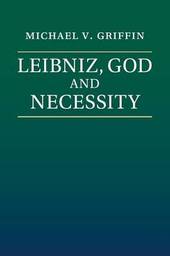
|
Leibniz, God and Necessity
Paperback / softback
Main Details
| Title |
Leibniz, God and Necessity
|
| Authors and Contributors |
By (author) Michael V. Griffin
|
| Physical Properties |
| Format:Paperback / softback | | Pages:208 | | Dimensions(mm): Height 229,Width 152 |
|
| Category/Genre | Western philosophy - c 1600 to c 1900
Philosophy - metaphysics and ontology
Philosophy of religion |
|---|
| ISBN/Barcode |
9781107538894
|
| Classifications | Dewey:111 |
|---|
| Audience | | Professional & Vocational | |
|---|
| Illustrations |
Worked examples or Exercises; Printed music items
|
|
Publishing Details |
| Publisher |
Cambridge University Press
|
| Imprint |
Cambridge University Press
|
| Publication Date |
9 July 2015 |
| Publication Country |
United Kingdom
|
Description
Leibniz states that 'metaphysics is natural theology', and this is especially true of his metaphysics of modality. In this book, Michael V. Griffin examines the deep connection between the two and the philosophical consequences which follow from it. Grounding many of Leibniz's modal conceptions in his theology, Griffin develops a new interpretation of the ontological argument in Leibniz and Descartes. This interpretation demonstrates that their understanding God's necessary existence cannot be construed in contemporary modal logical terms. He goes on to develop a necessitarian interpretation of Leibniz, arguing that Leibniz, like Spinoza, is committed to the thesis that everything actual is metaphysically necessary, but that Leibniz rejects Spinoza's denial of God's moral perfection. His book will appeal to scholars of early modern philosophy and philosophers interested in modal metaphysics and the philosophy of religion.
Author Biography
Michael V. Griffin is Associate Professor of Philosophy at the Central European University.
Reviews'... provides an interesting and thought-provoking revision to the ontological argument, understood not as a logical demonstration but as a search for the (not strictly logical) reasons grounding God's existence. Griffin's book is admirably clear and concise and should be accessible to advanced students and scholars of any field.' Larry M. Jorgensen, International Journal for Philosophy of Religion
|